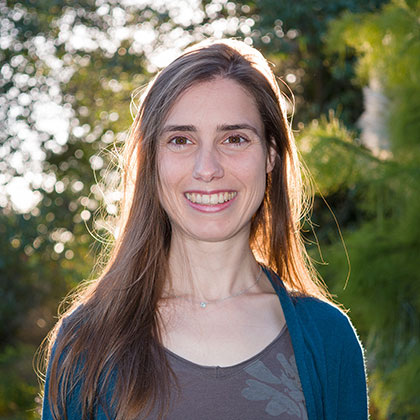Contact

Dr Stefanie Mühlhausen
GWDG
Gesellschaft für wissenschaftliche Datenverarbeitung mbH Göttingen
me@stefaniemuehlhausen.de
I am interested in the evolution of genetic codes, particularly in nuclear genomes and particularly in yeasts.
Translation of DNA into protein is absolutely fundamental in biology, and yet deviations from canonical rules for translation exist. The vast majority of those alternative genetic codes occur in the comparatively small and skewed genomes of organelles. Some, however, affect nuclear genomes. They divide into two categories: canonical stop codons no longer serving as termination signals but rather being read as amino acid and sense codons being reassigned from one to another amino acid. This division is mirrored in affected phylogenetic groups. In protists, we see various stop-to-sense codon reassignments whereas sense-to-sense reassignments are so far only known in yeasts.
In Saccharomycetales clade of yeasts, the CUG codon underwent multiple, independent changes: it has not only been reassigned twice from leucine to serine in two independent branches, but also to alanine in yet another branch. To top it all, in Ascoidea asiatica CUG has been released from the fundamental constrain inherent to all codes: determining translation.
In A. asiatica the protein sequence cannot even in principle be worked out from DNA sequence alone, as CUG is translated stochastically into leucine or serine. With describing a translation system involving competing CUG decoders translating the codon into two different amino acids, we challenged the fundamental dogma of molecular biology – that the translation of DNA into protein follows a deterministic set of rules.
It is not only the codon identity that matters, but also its usage. Codon usage is site-dependent and organism specific. Carefully observing underlying patterns, we can use this to mimic nucleotide composition in a specific species, for example human. Matching host-specific codon usage should enhance a genes’ translation efficiency, and thus making it work better as a transgene. Obviously, one can also do the opposite - introduce synonymous changes to skew codons away from mutational equilibrium to attenuate, rather than enhance, a gene. We’ve put forward an evolutionary-informed approach for Sars-CoV-2 vaccine design.
(December 2020)
S. Mühlhausen, LD. Hurst. Transgene-design: a web application for the design of mammalian transgenes. Bioinformatics (2022).
S. Mühlhausen, HD. Schmitt, U. Plessmann, P. Mienkus, P. Sternisek, T. Perl, M. Weig, H. Urlaub, O. Bader, M. Kollmar. Proteogenomics analysis of CUG codon translation in the human pathogen Candida albicans. BMC Biol 19(1), 258 (2021).
AC. Morales, AM. Rice, AT. Ho, C. Mordstein, S. Mühlhausen, S. Watson, L. Cano, B. Young, G. Kudla, LD. Hurst. Causes and Consequences of Purifying Selection on SARS-CoV-2 . Genome Biol Evol 13(10), evab196 (2021).
AM. Rice, A. Castillo Morales, AT Ho, C. Mordstein, S. Mühlhausen, S. Watson, L. Cano, B. Young, G. Kudla, LD. Hurst. Evidence for strong mutation bias towards, and selection against, U content in SARS-CoV-2: implications for vaccine design. Mol Biol Evol 38(1), 67–83 (2021).
K. Hatje, S. Mühlhausen, D. Simm, M. Kollmar. The Protein‐Coding Human Genome: Annotating High‐Hanging Fruits. BioEssays 41(11) (2019).
S. Mühlhausen, HD. Schmitt, KT. Pan, U. Plessmann, H. Urlaub, LD. Hurst, M. Kollmar. Endogenous Stochastic Decoding of the CUG Codon by Competing Ser- and Leu-tRNAs in Ascoidea asiatica. Curr Biol 28(13), 2046 - 2057.e5 (2018).
M. Kollmar, S. Mühlhausen. Myosin repertoire expansion coincides with eukaryotic diversification in the Mesoproterozoic era. BMC Evol Biol 17(1), 211 (2017).
M. Kollmar, S. Mühlhausen. Nuclear codon reassignments in the genomics era and mechanisms behind their evolution. Bioessays 39(5) (2017).
M. Kollmar, S. Mühlhausen. How tRNAs dictate nuclear codon reassignments: Only a few can capture non-cognate codons. RNA Biol 14(3), 293-299 (2017).
S. Mühlhausen, P. Findeisen, U. Plessmann, H. Urlaub, M. Kollmar. A novel nuclear genetic code alteration in yeasts and the evolution of codon reassignment in eukaryotes. Genome Res 26(7), 945-955 (2016).
S. Mühlhausen, M. Hellkamp, M. Kollmar. GenePainter v. 2.0 resolves the taxonomic distribution of intron positions. Bioinformatics 31(8), 1302-1304 (2015).
P. Findeisen, S. Mühlhausen, S. Dempewolf, J. Hertzog, A. Zietlow et al. Six subgroups and extensive recent duplications characterize the evolution of the eukaryotic tubulin protein family. Genome Biol Evol 6(9), 2274-2288 (2014).
S. Mühlhausen, M. Kollmar. Molecular phylogeny of sequenced saccharomycetes reveals polyphyly of the alternative yeast codon usage. Genome Biol Evol 6(12), 3222-3237 (2014).
S. Mühlhausen, M. Kollmar. Predicting the fungal CUG codon translation with Bagheera. BMC Genomics 15, 411 (2014).
S. Mühlhausen, M. Kollmar. Whole genome duplication events in plant evolution reconstructed and predicted using myosin motor proteins. BMC Evol Biol 13, 202 (2013).
B. Hammesfahr, F. Odronitz, S. Mühlhausen, S. Waack, M. Kollmar. GenePainter: a fast tool for aligning gene structures of eukaryotic protein families, visualizing the alignments and mapping gene structures onto protein structures. BMC Bioinformatics 14, 77 (2013).
T. Lingner, S. Mühlhausen, T. Gabaldón, C. Notredame, P. Meinicke. Predicting phenotypic traits of prokaryotes from protein domain frequencies. BMC Bioinformatics 11, 481 (2010).
Stochastic encoding in Ascoidea asiatica (Video abstract series of Current Biology, 2018): https://youtu.be/YVc79iTyXPE
Breaking the Wall of the Early Earth (Falling Walls Lab, 2014): https://youtu.be/zkuSgetd9QY
